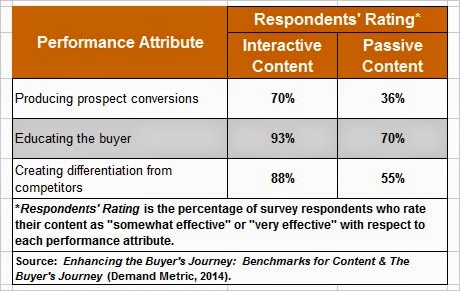Research also shows that the use of content marketing is continuing to grow.
- In the 2015 "B2B Content Marketing Benchmarks, Budgets, and Trends - North America" survey by CMI and MarketingProfs (the "2015 CMI survey"), 70% of respondents said they are producing more content than they did one year earlier, and 55% said they planned to increase their content marketing spending.
- In the "2014 BtoB Outlook: Marketing Priorities and Plans" study by Advertising Age, 75% of surveyed marketers said they planned to increase their content budget in 2014, and only 1.3% said they would decrease their content budget this year.
Despite their commitment to content marketing, many marketers are not satisfied with the results produced by their content marketing efforts. For example:
- In the 2015 CMI survey, only 38% of respondents said they believe their content marketing efforts have been effective.
- In another study by CMI of B2B marketers in large enterprises (companies with 1,000+ employees), only 32% of survey respondents rated their content marketing programs as effective or very effective. ("B2B Enterprise Content Marketing: 2014 Benchmarks, Budgets, and Trends - North America").
- In a July 2014 survey by Starfleet Media, 35% of respondents said they had "not been successful at all" with their content marketing efforts.
While some of this dissatisfaction undoubtedly relates to the actual performance of content marketing programs, I suggest that most of the uncertainty about content marketing exists because marketers aren't confident that they can accurately measure the business results produced by their content marketing efforts.
A 2014 survey by Contently clearly demonstrated that many marketers lack confidence in their ability to measure the business impact of content marketing. The table below shows how marketers described the effectiveness of their content-related metrics at measuring the business results produced by their content marketing programs. As the table shows, only 9.4% of surveyed marketers said they are very confident that their key performance metrics for content are effective at measuring business results. Another 45% said they are "kind of confident" in the effectiveness of their content performance metrics.
It's difficult to measure the impact of content marketing on business outcomes such as revenues because, like many marketing tactics, most content marketing activities don't directly produce immediate revenues. Despite the challenges, however, it's important for marketers to find ways to measure the value of content marketing and communicate that value to senior company leaders. Without compelling evidence that content marketing is producing significant value, the support for content marketing may begin to wane. In a future post, I'll discuss how marketers can approach the challenge of measuring the impact of content marketing.







